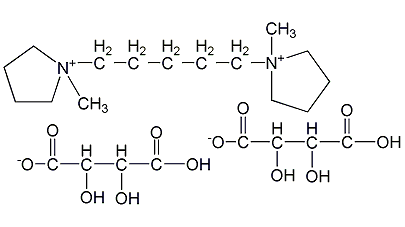
Structural formula
| Business number | 015J |
|---|---|
| Molecular formula | C23H42N2O12 |
| Molecular weight | 538.59 |
| label |
pentypyridinium tartrate, 1,1’-pentamethylenebis(1-methylpyrrolidiniumtartrate), 1,1’-pentamethylenebis(1-methyl-pyrrolidiniutartrate(1:2) |
Numbering system
CAS number:52-62-0
MDL number:MFCD00135580
EINECS number:200-146-7
RTECS number:UY4900000
BRN number:None
PubChem number:24852870
Physical property data
1. Characteristics: Colorless to slightly yellow liquid.
2. Density ( g/mL,25/4℃):1.507
3. Relative vapor density (g/mL,AIR=1): Undetermined
4. Melting point ( ºC):328-329
5. Boiling point ( ºC,Normal pressure): Undetermined
6. Boiling point ( ºC,5.2kPa):169℃(756mmHg)
7. Refractive index :1.5310
8. Flash point (ºC): 73
9. Specific optical activity Degree (º): Undetermined
10. Spontaneous ignition point or ignition temperature (ºC): Undetermined
11. Vapor Pressure (kPa,25ºC):1.68mPa
12. Saturated steam Pressure (kPa,60ºC): Undetermined
13. Burning heat (KJ/mol): Undetermined
14. Critical temperature (ºC): Undetermined
15. Critical Pressure (KPa): Undetermined
16. Oil and water ( Octanol/Log value of water) partition coefficient: Undetermined
17. Explosion limit (%,V/V): Undetermined
18. Lower explosion limit (%,V/V): Undetermined
19. Solubility: soluble in water.
Toxicological data
1, acute toxicity: rat oral LD50: 890mg/kg; rat abdominal cavity LD50: 28900ug/kg; rat intravenous LD50: 50760ug/kg; mouse oral LD50: 512mg/kg;
Mouse abdominal LD50: 36 mg/kg; Mouse subcutaneous LDLo: 94mg/kg; Mouse intravenous LD50: 29 mg/kg; dog intravenous LD50: 10 mg/kg
Ecological data
None yet
Molecular structure data
None yet
Compute chemical data
1. Reference value for hydrophobic parameter calculation (XlogP):
2. Number of hydrogen bond donors: 6
3. Number of hydrogen bond acceptors: 12
4. Number of rotatable chemical bonds: 10
5. Number of tautomers:
6. Topological molecular polar surface area (TPSA):236
7. Number of heavy atoms: 37
8. Surface charge: 0
9. Complexity: 347
10. Number of isotope atoms: 0
11. Determine the number of atomic stereocenters: 0
12. The number of uncertain atomic stereocenters: 4
13. Determine the number of stereocenters of chemical bonds: 0
14. Uncertain number of chemical bond stereocenters: 0
15. Number of covalent bond units: 3
Properties and stability
None yet
Storage method
This product should be sealed and stored away from light.
Synthesis method
None yet
Purpose
Medicine. pesticide. Intermediates for liquid crystal materials.
extended-reading:https://www.cyclohexylamine.net/category/product/page/23/extended-reading:https://www.bdmaee.net/wp-content/uploads/2022/08/-2039-catalyst-2039–2039-catalyst.pdfextended-reading:https://www.newtopchem.com/archives/category/products/page/133extended-reading:https://www.bdmaee.net/polycat-46-catalyst-cas127-08-2-evonik-germany/extended-reading:https://www.bdmaee.net/chloriddi-n-butylcinicity/extended-reading:https://www.bdmaee.net/polycat-46-pc-cat-tka-catalyst-polycat-46/extended-reading:https://www.cyclohexylamine.net/category/product/page/28/extended-reading:https://www.cyclohexylamine.net/strong-gel-catalyst-dabco-dc1-delayed-strong-gel-catalyst/extended-reading:https://www.bdmaee.net/reactive-composite-catalyst/extended-reading:https://www.newtopchem.com/archives/44716


